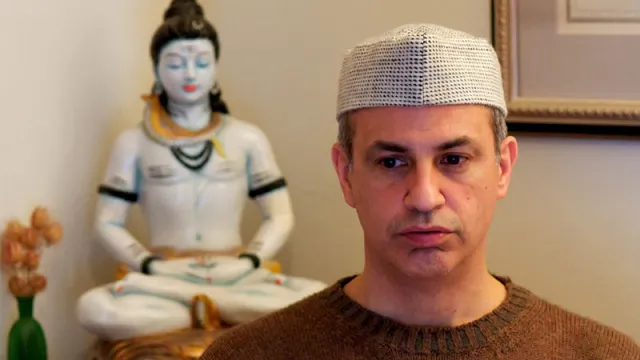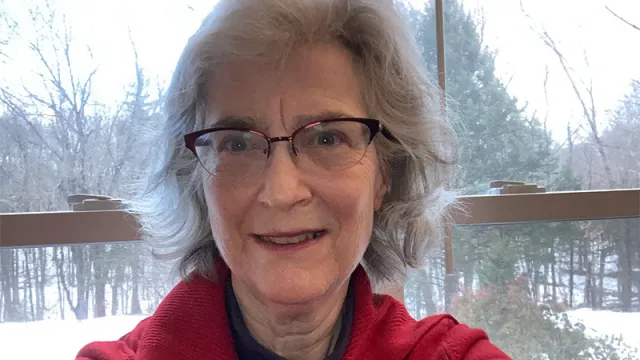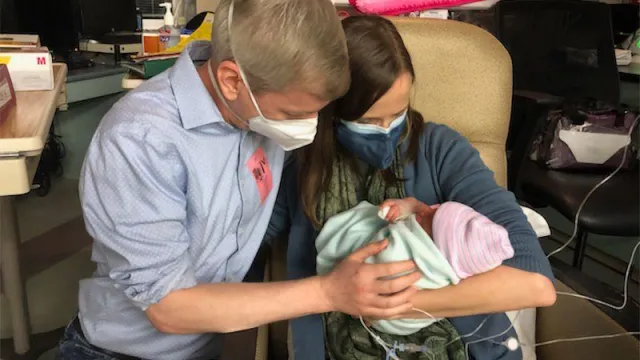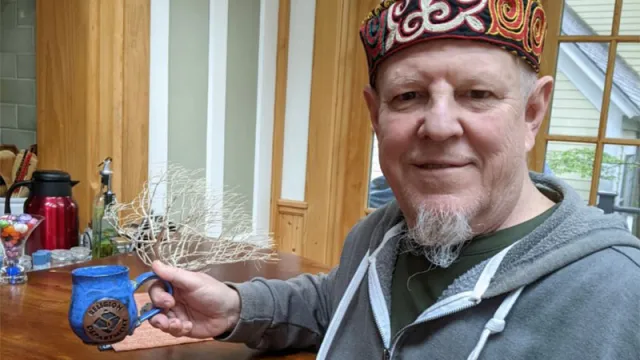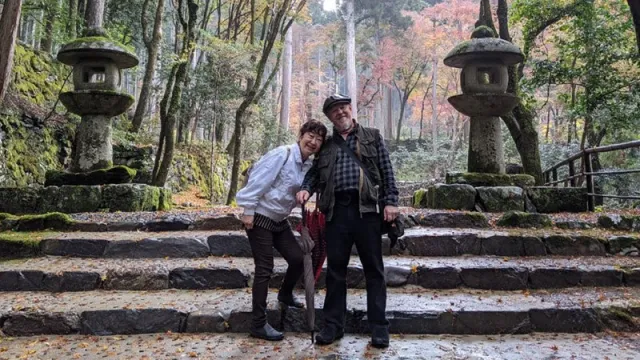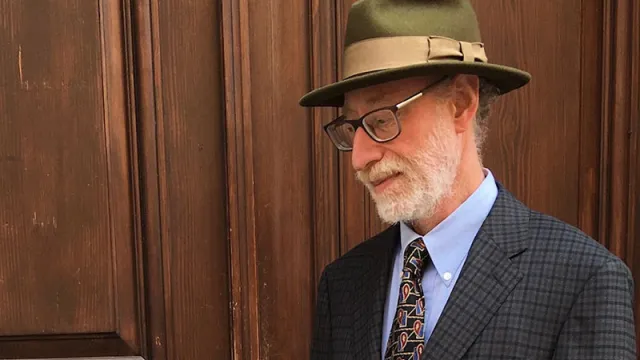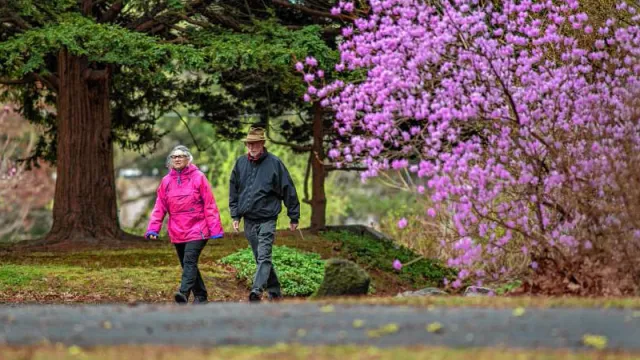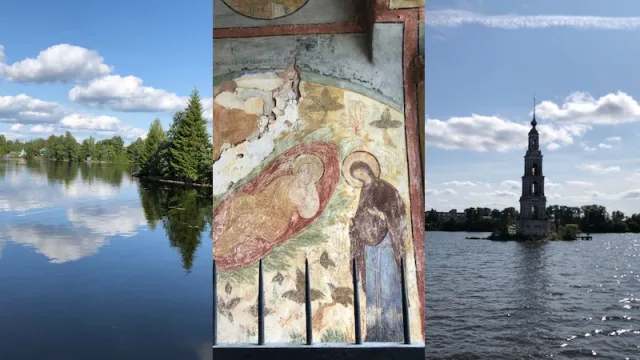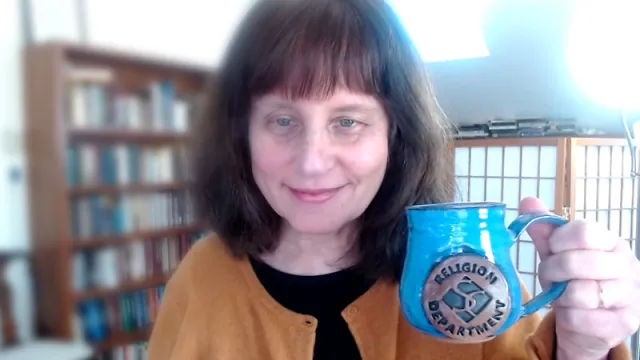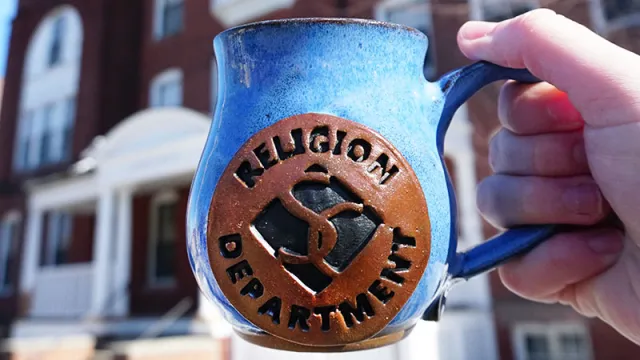Religion - Newsletter June 2021
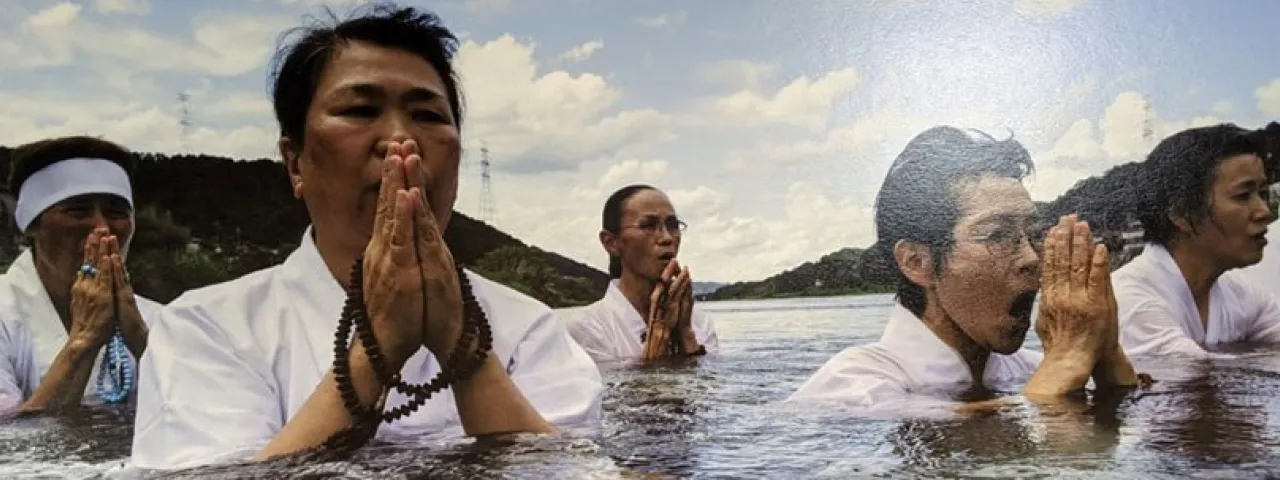
June 2021
From the Chair
Dear Smith College Religion Department Alums and Current Religion Majors/Minors,
We want to stay connected with you! To that end, we create a newsletter each year, offering updates about the department and all of you. If you have an update you would like to share, please send it to Phoebe McKinnell at pmckinnell@smith.edu. With the pandemic at bay, Smith College is planning for students, faculty, and staff to be back on campus for the fall 2021 semester. So if you find yourself in Northampton, please stop in for a visit. You’re also welcome to come to our events, as almost all of them are open to the public. And remember, you can keep up with the department through our postings on our home page and on Facebook.
Take care, everyone!
Andy Rotman, Chair
On behalf of Lois, David, Jamie, Joel, Phoebe, Suleiman, Vera, and Carol
Spring 2022
Graduates & Awards
Religion Department Awards
James Gardner Buttrick Prize
For the best essay written by a Smith undergraduate on a subject in the field of religious studies
Naomi Brill ’22, “Gifts, Alienation, and a Moral Community: Masks as a Binding Force in Winne House”
Phoebe Rendon-Nissenbaum ’22, “The Art of the Angel Wing: A Visual Exploration of the Artistic Use of the Natural and the Unnatural to Represent the Supernatural in Christian Depictions of Angel Wings” (a website)
Henry Lewis Foote Memorial Prize
For the best essay written by a Smith undergraduate on a subject in the field of biblical studies
Caterina Baffa ’21, “Human Friendship as a Test for Faithfulness in Sirach”
Jochanan H.A. Wijnhoven Prize
For the best essay written by a Smith undergraduate on a subject in Jewish religious thought
Eliza Menzel ’23, “Tikkun Olam, or Healing the World: Re-imagining a Justice-Centered Approach to Synagogue”
Class of 2021
Before the pandemic, in winter 2020, Professor Joel Kaminsky (department Chair at the time) discussed with Naomi Brill ’22 a project to design ceramic mugs as gifts for graduating Religion majors and minors. Designing progressed over summer 2020 and Naomi was able to work in her studio during Interterm to complete the mugs. We’ve now been able to give mugs to all the 2020 and ’21 graduates. Religion department alums interested in purchasing one can contact Naomi at naomibrillceramics@gmail.com.
About the Maker
My name is Naomi Brill, and I am a Religion major in the class of 2022. I grew up in Malden, Massachusetts, and I started my pottery journey as a junior at Malden High. After my first semester of ceramics, I was hooked, and I spent all my free class periods in the studio. These days I spend my summers at the Clay School in Lynn, Massachusetts, where I experiment with forms and techniques and make pieces to stock my Etsy shop. I do most of my work on the wheel, and I could happily spend all day throwing and trimming pots! Over the last few years I’ve tried out various mug forms until I finally mastered my favorite: a form that tapers from a wide bottom into a smaller top, with a flared rim, a large handle, and my signature swirl on the bottom, as you’ll find on these Religion department mugs.
Alice Wieland Harrison ’59
My major in Religion was partly motivated by the excellence of the teaching I had experienced in several Religion courses. Much of my personal journey has been formed by my lifelong, active Episcopalian. My faith and my family instilled in me the importance of service to others. In recent years I have been privileged to work with patients as a palliative care and hospice volunteer.
Barbara Newberry Lindsley ’60
Such a long time ago (60 years +) that I studied religion at Smith! Since then, I married an Episcopal priest, am very active in my church and in the New York Altar Guild, a philanthropic organization under the aegis of the Episcopal Diocese of NY, that recycles altar furnishings and vestments worldwide. I remember wonderful, caring professors in the department at Smith. I continued my studies during my Junior year at the University of Geneva, Switzerland...all in French! Result: French is now my second language.
Christie Barnard Smith ’60
I graduated in 1960, cum laude in Religion. ;Yes, I am 82 years old. I can’t believe it either. I started as a Philosophy major and after one semester decided to change to Religion. I am not religious — even considered not attending Smith because I was told everyone had to take a class in religion (which was not true). My decision to switch majors was based on the teachers in the department whom I perceived to be younger and more vital than the Philosophy faculty. The curriculum in both departments was similar, and I was happy with my choice. My honors thesis was a comparative analysis of the works of Martin Buber and Albert Camus. Pretty diverse, eh? Surprise: the two men both led lives of integrity, honesty, compassion, and passion. . .similar “good” lives. Today, in our turbulent times, more people need to realize that people from many different backgrounds and beliefs can lead satisfying, honorable, “good” lives. I had a poem published in a campus publication which began:
take it from me kiddos
our father who art in question
This was rewrite of ee cummings’ “Inherit the Windy”. I was shouting my frustration at the unending futile arguments about the proof for and against God’s existence. It was fun to write!
Deborah Clark Stewart ’65
My major in comparative religion in 1964–65 seems, in hindsight, intuitive. Marriage, children and various career paths led to clinical social work and training as a Jungian psychoanalyst. I’m now director of admissions at the Inter-Regional Society of Jungian Analysts and co-Director of the Philadelphia Jung Seminar. I appreciate ever more deeply how Jung’s work rests on mythos and Jung’s concept of the religious instinct. Three colleagues and I have a podcast, www.thisjungianlife.com, and started an online Dream School to help people work with their dreams. We have been astonished by the robust response to our work.
Merrill McLoughlin ’66
I have no idea whether this is an appropriate sort of update for the newsletter, but thought it was worth giving credit where credit is due—in my case, to the Smith Religion department. I graduated from Smith with one goal: to become a doctor. But I had no money for medical school, and had to find a way to earn some. Newsweek magazine was looking for editorial researchers, and I applied. When the chief of research asked what subjects particularly interested me, I said medicine, of course, and also religion, which had been my major. She nearly leapt out of her chair! No one, she said, had ever requested the religion department; they’d always had to force people to become the religion researcher. I got the job.
Long story short: I loved it. I was seduced by journalism, which, much like college, meant always learning something new, always trying to understand the world, always looking for truth. I went on to become Newsweek’s education editor, then national affairs editor. Along the way, I was part of the first successful sexual discrimination suit by professional women, a story told in the book and TV series “The Good Girls Revolt.” Ultimately I became, with my husband, co-editor of US News & World Report, the first woman at the top of the masthead at one of the three major newsmagazines. And all because of majoring in religion at Smith! Thank you, Religion department, for a wonderful life.
Susan Miller ’68
I was a (self-reported) World Religion major in 1968, taking the few class I could find on Eastern cultures. One of my favorite seminars was from Rabindrinath Tagore, Gandhi’s personal secretary. I also recall sitting in a library cubical literally holding up two hands and saying with one hand “To Be” and with the other hand “To Do.” How to do and be in balance, a life long quest. I have found my own path as a Christian-Buddhist meditator. The Episcopalian priest who led a group at the Center for Spiritual Development in Seattle on the west side of Lake Washington for 20 years (before we moved across) could not be replicated on the east side of Lake Washington when we retired/moved to the unincorporated east side 16 years ago, so I adapted to the Seattle Insight Meditiation or SIM’s group. Awakening takes a lifetime.
Kristin Stabb ’68
I had a wonderful time at Smith and was very glad to be part of the Religion department as an undergraduate. My most memorable learning experiences were with Jochanan Wijnhoven and Sten Stenson (my advisor). While attending many various classes, my major was actually Philosophy of Religion. I graduated in 1968. In 1979, I graduated from Pacific Lutheran Theological Seminary in Berkeley California. The following year, I was ordained in San Diego by the Lutheran Church in America (Pacific Southwest Synod). For several years, I was the only Lutheran woman pastor in San Diego County so that was a particularly interesting time in ministry. Subsequently, I served four parishes (Gethsemane Lutheran Church, San Diego; The Lutheran Church of the Incarnation, Poway, CA; Crusader Lutheran Church, Rockville, MD; and Hope Lutheran Church, Philadelphia) and am now retired, living in Benicia, California.
Ellen Dibble ’69
1969 is a very long time ago in terms of updates in Christian academia. In the late ’60s, I wanted to know more about different branches of Christianity here in the United States. I think I have a better handle on that now. I’m curious about how Islam is taught. I was studying a lot about Judaism, and nobody said, oh, but you aren’t Jewish. It didn’t occur to me to wonder. And the late ’60s were quite the years to be studying that. A professor suggested, how about studying mysticism? Actually, for Christian theology, how about being archaeologists of papyrus remains? I am extremely grateful for the grounding in history and philosophy, from China to Denmark, India to Prague.
Sandra Lillydahl ’69
For the last 20 years I’ve been studying iconography under the tutelage of the Prosopon School (founded by Vladeslav Andrejev), creating traditional images with gold leaf, pigments, and egg tempera. As theology in color, working with each image becomes an exploration of meaning and presence—a living prayer.
Icons by Sandy Lillydahl (left to right): Christ as the Good Shepherd, Hodegetria—the One Who Shows the Way (Mary with Emmanuel), the Trinity, the Archangel Michael as Patron saint of Grace Episcopal Church in Amherst, Massachusetts
Susan McCaslin ’71
I taught for 29 years in the Philosophy and Religious Studies Department at Phillips Academy Andover. Now retired, I continue to teach religious studies at Osher Lifelong Learning Institute at Dartmouth. I am currently doing a course on Job.
Augusta Molnar ’73
In 1973 when I was constructing my Religion major around South and East Asian culture and societies, the department was rich in Asian studies and had more to offer there than the Philosophy or Anthropology departments. So—an agnostic—I became a Religion major. It has served me well though when I entered the World Bank as a social development specialist I changed the department I listed to Philosophy lest my colleagues ignore my recommendations. I turned to anthropology and south asian studies for my two masters and an anthro Ph.D. at the University of Wisconsin. Why did this B.A. major do so much for my mental development?
I lived and worked in South Asia with a better understanding of beliefs and culture—further strengthened by the strong language and area studies at Madison, WI. Taking courses in early Christianity made me realize how the church leaders in history changed Jesus’ teachings to control women, preach homophobia, and murder dissenters (much as Buddhist monks did later after the 3rd century B.C.E. in India). I learned what Jewish philosophers had to say—surprising Swedish Jews I met during an FAO conference much later, that a ‘Christian’ knew so much about their core knowledge base. I benefitted from the extra-curricular department events—a Zen yoga retreat on campus by a renowned Roshi, Indian Bharatnatyam dancers performing on campus coming through from a Boston engagement. For my thesis, I compared Christian existentialists to Buddhist existentialists under Dr. Taitetsu Uno, and found the logic and thinking very much the same, i.e., that ‘nothingness’ is not non-engagement in social justice and moral good, but rather freedom to treat all humans and nature as equal, valuable and right holders.
While I remained an ‘agnostic’—appalled at how organized religions twisted teachings to serve their own elites—and men—and still convinced the universe includes humans but is not made around us, I gained a confidence in my moral ground and openness to other belief systems. This was useful in Nepal doing fieldwork in an animist culture, useful supporting defenders of Indigenous Peoples’ rights and right to collective land and property, and their right to a self-identified belief structure. And useful to question the “Washington Consensus” that the World Bank and other development agencies convinced themselves of in the 1980s and held onto long after it should have been debunked.
My hope: that the department focus on how it is that the ‘Great Religions’ end up oppressing so many people, when the spiritual and philosophical messages are so beautiful and worthy. How can Smith students make a dent in that horror and bring us to a better world. And those students of color and from countries with still oppressive policies can use what they learn to create a just world for themselves and more justice for others. When I see President Trump holding a Bible, when he neither believes in God, Jesus, or humanity, I wonder how it is that his followers are blind to that fact—and how to change that. And that the department not lose its strong teaching of the history of major faiths it does now, but bring in more of the alternative belief systems that enable students to see the multiple ways of knowing the universe, of believing, and of engaging one another. And of relating to the natural world in a much more direct way than those of us steeped in the ‘Great Religions.’
Amy Hill Shevitz ’75
I’m teaching Judaism and Introduction to Religion at Loyola University Chicago. My article “Franz Rosenzweig, Adele Alsberg Rosenzweig, and the German Jewish Family” was published in the Leo Baeck Institute Year Book, Vol 65, no. 1 (2020). It is based on my ongoing work about the three most important women in the life of philosopher-theologian Franz Rosenzweig (Germany, 1886–1929). I first studied Rosenzweig with Jochanan Wijnhoven (of blessed memory) in 1973. One of these days I will actually finish my book and THAT will be news!
Stephanie Frost ’77
After over 35 years in non-profit health care/coverage and 25 years as a volunteer lay leader in our children’s and youth programs at church, I am slowly stepping forward toward retirement. Can’t wait for COVID to be played out so I can return to choral singing and volunteering with children of all backgrounds. Life in Minnesota is good, even when it is challenging—as it has been, particularly in light of the murder of George Floyd here this summer. So much to wake up to each day.
Tracy Lee Garrett Rubin ’77
I teach adult Bible study and had to move to Zoom in March 2020. It lacks much of what we enjoy about gathering together, however it has some benefits. I’m able to screen share images on the fly as our conversation touches on unanticipated topics. Example, when reading the Gospel of Matthew the class was curious about the Garden of Gethsemane. I quickly found an image online and brought it up. Additionally, we’re now able to reach out beyond our local community (Massachusetts). I have participants from New Jersey, Oregon, California, Georgia, Texas, and more.
Susan E. Wyman ’77
I am a Preacher’s Kid (PK) and grew up in the tradition of The Congregational Christian Church (although I did serve UCC Churches and a Presbyterian Church). As I student, I double-majored in Religion and Government and Honored in Religion. I studied Religion because I wanted to understand the Bible and the history of Christianity. My education continued at Yale Divinity School (New Haven), although I took my Middle Year at St. Mary’s College, St. Andrew’s University in Scotland. It was a wonderful experience studying in the UK and worshipping in the town’s churches. I have served six churches over my ministry, tried balancing family, church and teaching World Religions, Ethics and Philosophy at a local Community College. Retirement? Sometime . . .
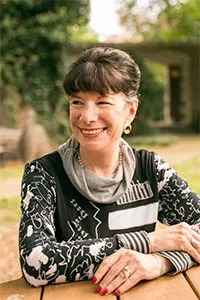
Amy Jill Levine ’78
Amy Jill Levine ’78
I was elected in April as part of the 2021 class of new members of the American Academy of Arts and Sciences: Smith religion major makes good! I am also retiring this year (officially, mid-August) from Vanderbilt, so my titles will shift to University Professor of New Testament Studies, Emerita, Mary Jane Werthan Chair of Jewish Studies, Emerita and University Professor of Jewish Studies, Emerita. (pictured)
Ann Clay Adams ’79
I currently serve as Associate Dean for Academic Administration at Columbia Theological Seminary in Decatur, GA, a graduate theological institution of the Presbyterian Church, USA. I have been ordained by the Presbyterian Church for 38 years and served as both a campus minister and a parish minister, before moving to theological education where I have served in both Student Affairs and Academic Affairs over the last 25 years. Due to my length of service in theological education and the work I do with accreditation, I have a good sense of degree programs, variety of schools, and other issues. If any of the religion majors or other students are exploring graduate theological education, and would like to talk with someone, I would be glad to speak with them, not about my school particularly, but various theological degrees, ordination, divinity schools versus seminaries, timing of theological education, etc. Feel free to contact me at adamsa@ctsnet.edu. There were a number of us at Smith when I was there who went into theological education, at a time when there certainly were not as many women as today.
Sharon Vardatira (Vardamis) ’79
Thank you so much for sending the religion department newsletter. When I finally got a break from work (to staycation), I read it through with great interest. It’s exciting to see the different areas students and professors are involved in. Some 40 years later, I’m surprised that it feels familiar—and not at all surprised that things have evolved so considerably since my time at Smith. Carry on—I hope everyone is surviving these bizarre times we find ourselves in. Stay well and keep doing good in the world!
Rebecca Goetz Clancy ’81
I am not sure this constitutes news, but here goes. Having served as pastor of First Congregational Church of Geneva, U.C.C. and on the faculty of the Religious Studies department at Elmhurst College for 25 years, I am "retiring" this spring to a farm in Wisconsin, where I hope to practice permaculture principles and ecological restoration.
Madonna Burke Quinn ’83
I’m a religious studies teacher at Northwest Catholic High School in West Hartford, CT. I have a Pastoral Ministry MA. and have completed the MEd program at Boston College’s former Institute of Religious Education and Pastoral Ministry. The courses which I have most enjoyed teaching are our Scripture classes and one which I designed on death and dying. Students have evolved quite a bit over the past 38 years. I certainly learned a great deal from Sten Harold Stenson.
Melissa Goodrich Arons ’90
I put my Smith Religion degree to good use and became religious! After graduating and working for a couple of years, I went to Israel where I lived for six years, taught English, worked at a magazine and gradually became more observant. I later came back to the States for a degree in Jewish Education from Yeshiva University, met my husband and moved to New Jersey and then Monsey, New York. I have three teen-aged kids and teach in a Jewish school here. Life is great, thank G-d, and I am so, so grateful to all my wonderful professors at Smith: Professor Wijnhoven, Professor Adelman, Professor Hudson, and Professor Hubbard, to name only a few. I would love to hear from Religion alums!
Amy Getchel Puzantian ’94
I’m excited about a webinar I was asked to be a part, "Immunized for Love: Vaccines and the Church" offered through Azusa Pacific University Seminary. I teach public health nursing, and this is a unique opportunity to integrate that with my interest in Religious Studies, in service to our community. Our target audience is church leaders and community members.
Rebecca Metzger ’98
Following graduation, I worked in New York City for six years doing public relations for museums, arts organizations, and artists. While I didn’t love PR, I did love working behind-the-scenes for cultural arts and heritage institutions. So after some career research, I decided to return to school to obtain my Masters of Library & Information Science from Simmons College in Boston. I was very lucky to get hired as a Reference, Instruction & Outreach Librarian at Lafayette College in Easton, PA. While there, I bought my first home and gave birth to my son, Noah. My dream job lured me to Santa Barbara, CA in 2012, where I still reside and work as Associate University Librarian for Learning & Engagement at the University of California, Santa Barbara. I manage a division of 50 employees and am responsible for the library’s public services.
I have so many fond memories of my years as a Religion major, but especially of the late Dennis Hudson, who advised me through an independent study on Gender & Islam in Southeast Asia, and who invited me to spend Passovers with his family (at the time, my family was living in the Philippines) and having the honor to study with Jewish feminist theologian Judith Plaskow, who was a visiting professor at the time.
Sunshine Finneran ’03
I graduated AC ’03 with an emphasis on Buddhism and Hinduism. Currently I’m completing the Fedloan Public Service Loan Forgiveness Program giving 10 years of service working in a psychiatric inpatient setting with a chronically underserved population in Hartford. In addition, I started an LLC, Therigatha Center for Psychotherapy, serving primarily women struggling with recovery from trauma and dissociation from a body-oriented approach engaging mindfulness and Buddhist psychology.
Emily Furey Bailey ’06
Things are slowly starting to transition back to some sense of normalcy here in Maryland, but there’s a long way to go. I’m happy to share that I just earned my tenure and promotion as Professor of Religious Studies here at Towson University, to begin in the fall. Thanks again to the program for a great foundation for the work that I’m lucky enough to do now.
Katherine Scott-Kirschner ’14
The Rev. Katherine Scott-Kirschner ’14 (nee Scott), began her new call as Solo Pastor of The First Presbyterian Church of Sussex, in Sussex, NJ on February 1, 2021. She’s excited and nervous to begin this new pastoral ministry. She previously served as an Associate Pastor, from March 2018 until September 2020. Living into transitions in a pandemic brought clarity and focus to her job discernment. Katherine is looking forward to the new skills she’ll develop in this new role.
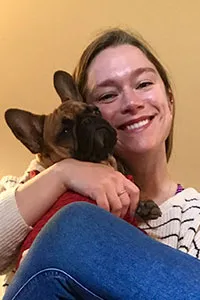
Casey Rau ’16 with Hoagie.
Casey Rau ’16
Hi Religion Department Friends! Casey here, made it through this past year in quarantine with my boyfriend Ben and our newest fur family member, Hoagie! We’ve been based in Portland, OR to stay close to my office at the Dr. Martens HQ, patiently waiting to see if we will reopen anytime soon… but we’ve been able to spend time in our hometown outside of Philly, thanks to remote work. Hope everyone is staying well, and finding renewed energy with the arrival of spring and vaccines. Photo: Casey with Hoagie.
Caroline Dunbar ’20
I’ll be starting my MA in European and Russian Studies at Yale University this fall! I’m hoping to continue my research focus on the cultural significance of Eastern Orthodoxy in Ukrainian history that I started through my work in the Smith religion department with Vera Shevzov. Additionally, this past fall, I interned at the Wilson Center’s History and Public Policy Program indexing and translating declassified Soviet archival documents for the Center’s Digital Archive.
